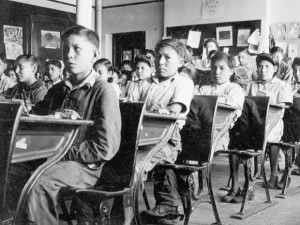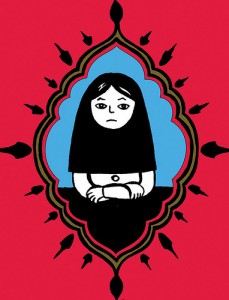This week in my ASTU class we read Marjane Satrapi, graphic memoir Persepolis. This graphic memoir displays the challenges Marjane has to face while living in Iran with her family during the Islamic Revolution. For today’s blog I want to concentrate on children’s innocence and how this can create different affects about the way they live and will grow up.

When Marjane meets her uncle Anoosh, it is evident through the images of her face in the graphic memoir that she became very captured by his stories about Iran. The way she cares about her country and heritage is very optimistic. Marjane’s innocence is extensively revealed because she does not understand or know everything that is happening in her oppressive regime. With all the attacks, restrictions, and constraints Marjane recognizes that she needs to step up and act like an adult. Masking her vulnerability allows her to take on the responsibility of having to be an independent woman when her parents send her to Austria. In comparison, this is what made me think about my sociology class. In class this week we were assigned to write a reflection paper about the effects of residential schools. We all know that residential schools are a significant topic in Canadian society to this day. The “assimilation of aboriginal children” is very aggressive and strip children of their innocence but more importantly, their identity (“Where are the Children).
Both Marjane and the children in residential school are exposed to violence, terror, and aggression. The children’s hopefulness is destroyed when a dominant figure, or petrifying situation comes into affect. The innocence they once had is gone. The children feel unsafe and essentially feel like they do not belong anywhere. Furthermore, being unprotected in the place where they are forced to learn or are living makes them frighten, and defenseless. For instance, Marjane had to wear a veil against her will to her segregated classes other wise she would be punished. In another manner, when children are taken away from their family at a very young age to go to residential school they mandatorily lose all of the culture.

I cannot imagine myself going through the obstacles these children go through. I know that children are still losing their innocence everyday and feel as if they need to grow up because the government, culture, and city is changing so severely. Nonetheless, Marjane and the children from residential schools innocence are both conveyed in different ways but are still experiencing the same affects.
Satrapi, Marjane, and Marjane Satrapi. Persepolis. New York: Pantheon Books, 2003. Print.
